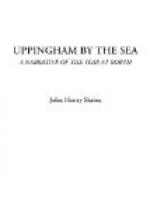We do not know how our defences would have stood the test of battle. They were not put to the proof, for the wind, veering to the north that morning, and blowing strongly all day, reduced again the volume of the water in the bay, and the following tides came and went harmlessly. But had the morrow repeated the terrors of this day, we should hardly have been up to witness them, for (proh pudor!) we rewarded ourselves for our exertions by a lie-a-bed next morning in place of early school.
Elsewhere the storm-wave had worked more havoc. At Ynyslas, a flock of one hundred and fifteen sheep were caught in their pastures, and drowned, the farmer rescuing only eleven. The cottagers were driven to their lofts, while the tide snatched away their furniture, doors, window-frames, and tables, and strewed them along the railway banks. There was flotsam and jetsam on what was now once more the coast-line at the village of Taliesin, where in old days the bard’s cradle had been washed ashore; here one poor woman recovered her parlour-table of heavy oak; her chairs had travelled farther yet to the door of a farmhouse in the extreme corner of the marsh. These people were greater sufferers than our villagers, but we could only help them by a subscription to replace their losses.
For ourselves, we suffered nothing except a temporary scarcity of coals and oil from the interruption of the railway traffic. It was a fortnight before the next train ran on the stretch between us and Machynlleth, and in the meanwhile the gap was bridged by a coach service. From four miles of embankment the ballast had been sapped away, and the sleepers and rails collapsing into the void presented a dismal picture of wreck.
Yes, we suffered one other privation. It was long before our football-field rose again from the deeps, and was dry enough for play. Its goalposts pricking up mournfully through the floods were a landmark which the boys recognised with rueful eyes in the midst of the drowned and deformed landscape.




